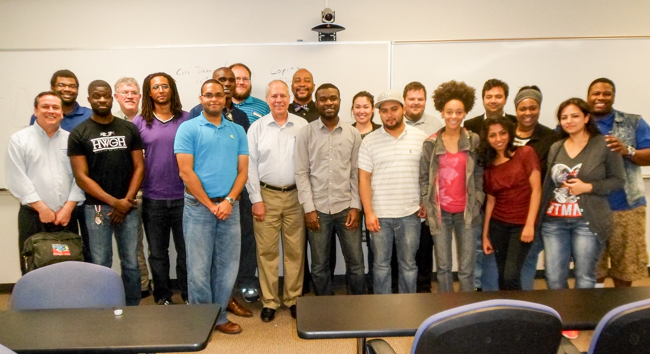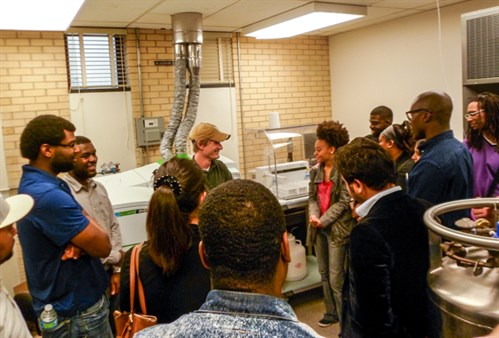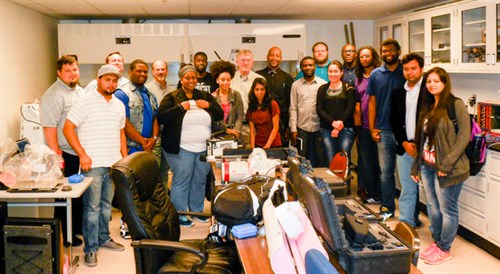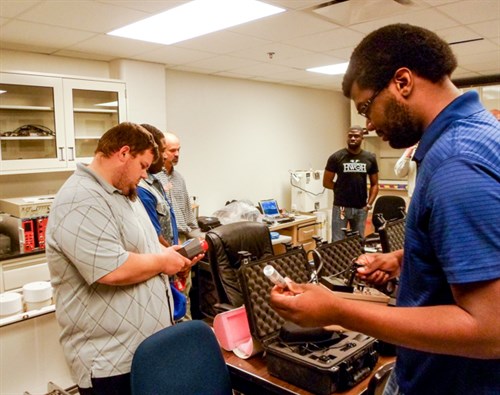
On Friday, April 10, twenty nuclear forensics students and faculty from Prairie View A&M University (PVAMU) visited the Texas A&M University campus as part of the Nuclear Forensics for Minority Serving Institutions (NF-MSI) program sponsored by the US Department of Homeland Security’s Domestic Nuclear Detection Office (DNDO). The visit was organized by Dr. Royal Elmore, a research assistant with the TEES Nuclear Security Science and Policy Institute (NSSPI) and guest scientist with Los Alamos National Laboratory. The students are currently enrolled in a nuclear forensic analysis course being taught by Dr. Irvin Osborne-Lee at PVAMU with assistance from Dr. Richard Wilkins and Dr. Brad Gersey, both of PVAMU, which is another component of the NF-MSI program.
The students began their tour at the Analytical Chemistry Laboratory in the Texas A&M Department of Chemistry, where Ph.D. student Aaron Clubb of Dr. Emile Schweikart’s research group introduced them to the lab’s Multi-Collector Inductively Coupled Plasma Mass Spectrometry (MC-ICP-MS) system. The presentation covered the theory behind MC-ICP-MS, a comparison of other MS tools, and the advantages of MC-ICP-MS for nuclear forensics.

The PVAMU students then participated in an informal lunch seminar with Dr. John Kelly from the US Department of Energy’s Office of Nuclear Energy. Dr. Kelly is the Deputy Assistant Secretary of Energy for Nuclear Reactor Technologies, and he addressed several policy and technical issues related to nuclear energy and forensics. Specifically, the PVAMU students learned about Generation III, III+, and IV reactors and nuclear fuel cycles from a proliferation resistance standpoint. With his talk Dr. Kelly helped frame how nuclear forensics is a later line of protection and deterrence for global nuclear security.
The students then visited the NSSPI Radiation Detection Laboratory with NSSPI faculty member Dr. Craig Marianno, where they were able to test out different radiation detectors while Dr. Marianno explained their nuclear forensics applications. The PVAMU students will be using the detectors in an upcoming hands-on field exercise at the Texas A&M Nuclear Science Center and the TEEX Disaster City facility.

In May, the PVAMU students plan to join students from Texas A&M on the 4th Annual Nuclear Facilities Experience (NFE), where they will visit the Urenco uranium enrichment plant, Sandia National Laboratories, and Los Alamos National Laboratory, all in New Mexico, as well as the Pantex nuclear weapons assembly and disassembly facility in Amarillo, Texas. The NFE is being conducted by NSSPI through the sponsorship of the Texas A&M College of Engineering and the Department of Nuclear Engineering. The students from PVAMU are being sponsored through the NF-MSI.
DNDO established the NF-MSI to strengthen the engineering and science programs at Minority Serving Institutions (MSI) located throughout the US and to enhance the partnerships between these institutions and other US universities with established academic programs in scientific disciplines relevant to nuclear forensics. The objective is to increase the participation of MSIs in the National Nuclear Forensics Expertise Development Program, of which this initiative is a part, and accelerate the involvement of minorities in the US Government nuclear forensics mission.
